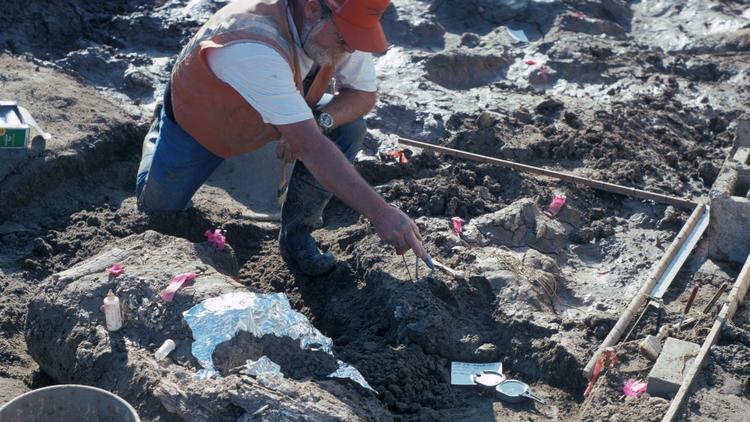Humans may have arrived in North America 115,000 years earlier than researchers thought

A free daily email with the biggest news stories of the day – and the best features from TheWeek.com
You are now subscribed
Your newsletter sign-up was successful
Researchers may have been off by nearly 115,000 years when they estimated that humans arrived in North America about 15,000 years ago. The potential miscalculation was uncovered by a collection of mastodon bones, which were discovered during construction work on a California freeway in 1992. After toiling for years to date the bones, researchers announced this week in a paper published in the scientific journal Nature that they'd determined the remains of the adult male mastodon to be about 130,000 years old — and to contain signs of human activity.
The finding is likely to be controversial. Already, Smithsonian Magazine noted, the question of when humans arrived in North America is "a flashpoint among archaeologists." There is no other evidence to indicate humans arrived tens of thousands of years earlier than has been suggested, but paleontologist Thomas Deméré, one of the study's authors, said they have the evidence to back up the claim. "I realize that 130,000 years is a really old date," Deméré said. "Of course, extraordinary claims like this require extraordinary evidence."
The mastodon bones that were uncovered bear "impact marks suggesting that they had been smacked with a hard object," Smithsonian Magazine reported. Researchers also discovered five massive stones at the site, which they believe humans may have used as hammers or anvils. The stones "showed signs of impact," Smithsonian Magazine said, and the bones were found piled up right around these stones.
The Week
Escape your echo chamber. Get the facts behind the news, plus analysis from multiple perspectives.

Sign up for The Week's Free Newsletters
From our morning news briefing to a weekly Good News Newsletter, get the best of The Week delivered directly to your inbox.
From our morning news briefing to a weekly Good News Newsletter, get the best of The Week delivered directly to your inbox.
"[W]e can eliminate all of the natural processes that break bones like this," said Steven Holen, another study co-author. "These bones were not broken by carnivore-chewing, they were not broken by other animals trampling on the bone."
A free daily email with the biggest news stories of the day – and the best features from TheWeek.com
-
 How the FCC’s ‘equal time’ rule works
How the FCC’s ‘equal time’ rule worksIn the Spotlight The law is at the heart of the Colbert-CBS conflict
-
 What is the endgame in the DHS shutdown?
What is the endgame in the DHS shutdown?Today’s Big Question Democrats want to rein in ICE’s immigration crackdown
-
 ‘Poor time management isn’t just an inconvenience’
‘Poor time management isn’t just an inconvenience’Instant Opinion Opinion, comment and editorials of the day
-
 Nobody seems surprised Wagner's Prigozhin died under suspicious circumstances
Nobody seems surprised Wagner's Prigozhin died under suspicious circumstancesSpeed Read
-
 Western mountain climbers allegedly left Pakistani porter to die on K2
Western mountain climbers allegedly left Pakistani porter to die on K2Speed Read
-
 'Circular saw blades' divide controversial Rio Grande buoys installed by Texas governor
'Circular saw blades' divide controversial Rio Grande buoys installed by Texas governorSpeed Read
-
 Los Angeles city workers stage 1-day walkout over labor conditions
Los Angeles city workers stage 1-day walkout over labor conditionsSpeed Read
-
 Mega Millions jackpot climbs to an estimated $1.55 billion
Mega Millions jackpot climbs to an estimated $1.55 billionSpeed Read
-
 Bangladesh dealing with worst dengue fever outbreak on record
Bangladesh dealing with worst dengue fever outbreak on recordSpeed Read
-
 Glacial outburst flooding in Juneau destroys homes
Glacial outburst flooding in Juneau destroys homesSpeed Read
-
 Scotland seeking 'monster hunters' to search for fabled Loch Ness creature
Scotland seeking 'monster hunters' to search for fabled Loch Ness creatureSpeed Read